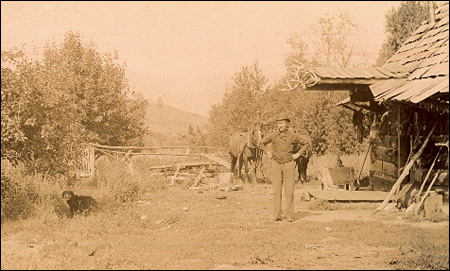| |
Naming Pearrygin
by Karen West
 Benjamin Franklin Pearrygin stands in front of his cabin near the lake that still bears his name. This is the only photograph of Mr. Pearrygin known to the Shafer Museum. Kit Cramer was recently working with Marilyn (Badger) Fischer to archive her family photos when they found the photograph, which the family shared with the Shafer Museum. From the estates of Raymond M. and Gladys Badger and Warren F. and Lois Badger. Courtesy of the Shafer Museum.
B.F. "Ben" Pearrygin scouted the Methow Valley in 1887, one year after it opened to white settlement. He claimed land on the lake that bears his name and would have taken up squatters rights until the land was surveyed and he could file for a homestead.
In 1888 he showed brothers Emil and Albert Ventzke around and advised them where to take up squatters rights. The Ventzkes were Prussian/German immigrants whose parents settled in Wisconsin. Emil, who was about 21 years old, settled near Cub Creek, and Albert, who was a few years older, near Rock View on the north fork of the Methow River, now more commonly known as the Chewuch River. (Their brother Fred Ventzke, a surveyor, took up a homestead near Winthrop in 1898.)
Little is known about Ben Pearrygin. The most complete, and unflattering, description of him is in an excerpt from a letter dated Jan. 21, 1916. It was written by Guy Waring, who founded Winthrop, to Professor Meany at the University of Washington. Meany had inquired about the origin of local place names. Waring said, "Pearrygin Lake ... was named after Benjamin Franklin Pearrygin; who was the third squatter in the valley and who located on this lake's shore. He was from Southern Illinois and had the appearance of one's ideal Portugese Pirate. I have little doubt that he was of Southern European descent and originally a "Perugino." He was undoubtedly an evil man and, I suspected, had sold his soul to the devil but had not collected the pay! He met his death by falling out of a barn loft while drunk and died after five days of agony that more than expiated all his sins. He was a merry soul, withal."
4/2/2012
|
|

 Benjamin Franklin Pearrygin stands in front of his cabin near the lake that still bears his name. This is the only photograph of Mr. Pearrygin known to the Shafer Museum. Kit Cramer was recently working with Marilyn (Badger) Fischer to archive her family photos when they found the photograph, which the family shared with the Shafer Museum. From the estates of Raymond M. and Gladys Badger and Warren F. and Lois Badger. Courtesy of the Shafer Museum.
Benjamin Franklin Pearrygin stands in front of his cabin near the lake that still bears his name. This is the only photograph of Mr. Pearrygin known to the Shafer Museum. Kit Cramer was recently working with Marilyn (Badger) Fischer to archive her family photos when they found the photograph, which the family shared with the Shafer Museum. From the estates of Raymond M. and Gladys Badger and Warren F. and Lois Badger. Courtesy of the Shafer Museum.